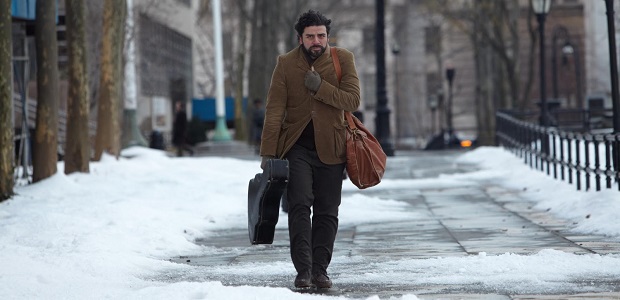It’s unclear how the Coen brothers’ new indie-looking Inside Llewyn Davis has been so overlooked alongside an admittedly deserving 12 Years a Slave at the Oscars. Of course, each explores wholly different historical themes, but shares an unravelling of lost time. As the days, months or years pass, protagonists from both films find it impossible to have any real sense of circumstances progressing or improving. They also address a randomness to hope: either in the form of eventual salvation or in the expression of one’s pedestrian tragedy through music.
For the Coens, this music is revived from the pre-Dylan grassroots folk scene of New York City’s Greenwich Village. Having already cut two albums – one with his former partner and a later solo – much has already happened before the Coens enter the life of bruised singer Llewyn Davis (Oscar Isaac). Davis’ struggle is far from the self-pitying yet whimsical gloom of Glen Hansard in Once however; he’s a more crushed soul whose talent will not automatically rescue him from financial and critical distress.
The music, full of nuance and bluesy melancholy, tells of real-life heartbreak that bleeds into the lyrics: “Hang Me, Oh Hang Me” and “The Shoals of Herring” feature as two outstandingly sweet yet spiralling tracks that set the mood of the whole film. Isaac is perfect in the role – in the same way Joaquin Phoenix was a snug fit for Johnny Cash in Walk the Line – and is accompanied by fine performances from Carey Mulligan and Justin Timberlake.
Perhaps the greater nuance, though, is how the Coens have mingled and woven their style in without compromising a straightforward and subtle piece of storytelling. They have their road trip, full-circle plot, wrung and wrought lead characters – even the desperate landscapes that mirror bleak contexts – but have told of an agonising beauty to suffering for one’s art: potentially as transient as the pursuit of success itself. They have pinpointed the long days of hard work that feel like months of toil and captured a sense of muted despair that is so difficult to convey on screen.
In a stroke of genius, the Coens have merely teased the notion of “a breaking point” – the lasting grip of torment can be found in the music. It is the reason Davis writhes yet those smooth notes are his only way out. The cycle of misfortune allows us to question where the edge really is and whether, ultimately, we even find therapy and peace in the talent we hold so dearly. It is understated and pitch-perfect: a sombre work which excavates the depth of our pursuits and the value of our accomplishments.
Follow Andrew on Twitter @ajlatimer.
